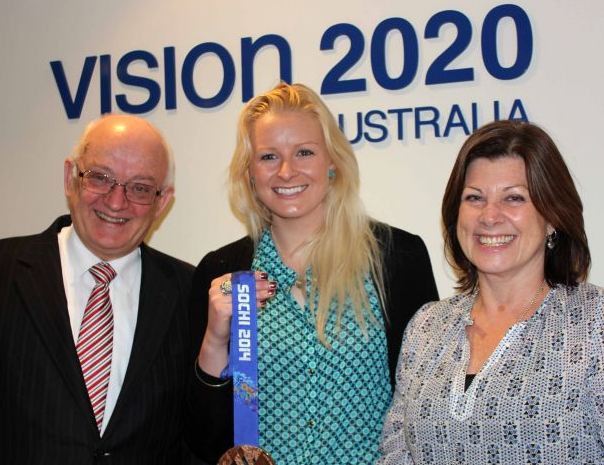Last week hundreds of members of the global low vision community converged in Melbourne for the 11th International Conference on Low Vision. While I didn’t attend as many sessions as I would have liked to—a regrettable outcome of attending a conference in the same city that you live and work—what I did attend was truly inspirational!
The conference opened with a discussion on humanized or ‘empathetic’ capitalism being used as a development paradigm for addressing the growing need for low vision services and devices—put simply—how to make low vision care sustainable and accessible.
It was also great to listen to our own Global Ambassador, Jess Gallagher, talk about the highs and lows she has experienced in the world of vision impaired sport and learn about the incredibly complex vision classification process Paralympians must go through and steps being taken to improve this system.

Image: Bob McMullan, Jessica Gallagher and Jennifer Gersbeck.
Closing the conference, the President of the International Agency for the Prevention of Blindness and former Minister of the Australian Government, Bob McMullan, called on all conference participants to work together and seize the opportunities before us. It was a stirring speech and a great way to end a successful conference ably coordinated by Vision Australia. Participants—including me—left feeling truly inspired!
The conference program was diverse and interesting, providing an opportunity for speakers to raise and discuss topics particularly relevant to their part of the world and to share research findings and lessons learned.
Of course the hot topic in Australia is the need to keep moving forward with the roll out of the National Disability Insurance Scheme (NDIS) and to make sure it doesn’t stall. There have undoubtedly been some teething problems, but we must remind ourselves that we are only eight months into a seven year roll out for the NDIS.
The first phase of the roll out was always going to be about transitioning existing state programs over and getting the systems and processes right. While people who are blind or have a vision impairment have been successful in getting a package of supports in the trial sites, the numbers have been lower than expected.
Together with the low vision and rehabilitation sector, Vision 2020 Australia is working to ensure pathways into the NDIS are inclusive of the needs of people who are blind or have a vision impairment. Critical to achieving this will be holistic specialist assessments undertaken by professionals who understand living with blindness and vision impairment, and matching the right support to each individual participant.
This is a similar case in the aged care sector where people who are blind or have a vision impairment need to navigate and be accepted into the system effectively as a first step to accessing services and supports to assist in daily living with vision loss.
As Bob McMullan reminded us in his closing address at the conference, there are opportunities before us—we must work together, maintain our efforts and continue to improve the system!
